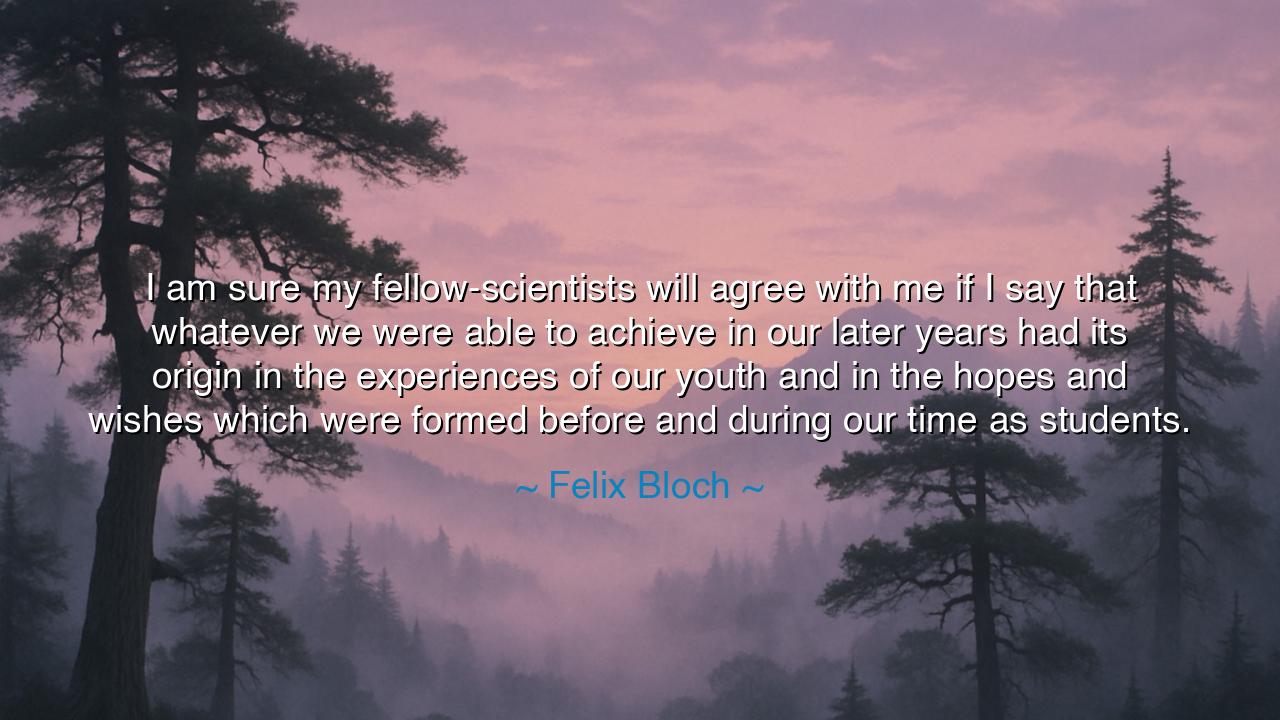
I am sure my fellow-scientists will agree with me if I say that
I am sure my fellow-scientists will agree with me if I say that whatever we were able to achieve in our later years had its origin in the experiences of our youth and in the hopes and wishes which were formed before and during our time as students.






“I am sure my fellow-scientists will agree with me if I say that whatever we were able to achieve in our later years had its origin in the experiences of our youth and in the hopes and wishes which were formed before and during our time as students.” Thus spoke Felix Bloch, Nobel Prize-winning physicist, whose insights illuminated the hidden world of nuclear magnetism and gave birth to discoveries that would change medicine and science forever. His words are not merely the reflection of an old man looking back, but a profound truth about the power of youth, and the sacred seeds planted in the heart during the days of learning.
The meaning of this saying lies in the recognition that greatness does not suddenly appear in the twilight of life, but is the fruit of seeds sown early. It is in the restless dreams of students, in the hunger of their curiosity, in the daring of their first experiments and their first failures, that the foundation of later triumph is laid. The scientist, the artist, the leader—all begin as students, driven not only by formal lessons but by the hopes and wishes that arise in the secret places of the young soul. To honor youth, then, is to honor the wellspring of all future achievement.
The ancients knew this truth well. The Greeks placed young men in the gymnasium, not merely to strengthen their bodies but to train their minds in philosophy and rhetoric, that they might be prepared to lead. Aristotle, teacher of Alexander the Great, sowed into the mind of the boy the seeds of empire. Rome too understood that the soldier’s discipline began in youth, and Confucius taught that the shaping of character must begin early if society itself was to stand firm. Bloch’s words are but a modern echo of this ancient wisdom: the experiences of youth are the forge upon which destiny is hammered.
Consider the life of Albert Einstein. In his youth, he questioned his teachers, resisted rote instruction, and daydreamed about chasing beams of light. These seemingly idle thoughts, formed in the imagination of a young student, became the foundation of the theory of relativity. Had Einstein’s youthful visions been crushed or ignored, the world might never have seen the scientific revolution that followed. Bloch himself, reflecting on his path, knew that the same was true of his own life—that what he later gave to the world had its birth in the hopes and questions of his student years.
But there is a deeper truth here as well: it is not only knowledge, but hope, that shapes the future. For without hope, knowledge grows cold; without dreams, facts lie lifeless. It is the young who dream most boldly, who dare to believe that impossible problems may be solved, that new worlds may be discovered, that life may be better than it is now. The elders achieve much because the youth dared to hope first. Thus Bloch honors not only the formal training of the student, but the secret wishes that dwell in young hearts.
The lesson for us is clear. Treasure your years of youth, and if they are past, do not despise them but remember what was planted there. Parents, nurture the hopes of your children, for they are not idle fantasies but the beginnings of future greatness. Teachers, honor the questions of your students, for in them lie the seeds of discoveries yet to come. And students, guard your curiosity, your dreams, your hunger for more, for these will become the tools with which you shape your destiny.
So let Bloch’s words echo as both testimony and prophecy: “Whatever we were able to achieve in our later years had its origin in the experiences of our youth.” Do not despise beginnings. Do not silence the dreamers. For the laboratories of tomorrow are already being built in the imaginations of students today. To honor youth is to honor the future, and to tend the dreams of the young is to build the greatness of generations yet unborn.






AAdministratorAdministrator
Welcome, honored guests. Please leave a comment, we will respond soon